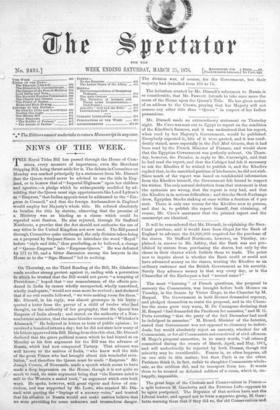On Thursday, on the Third Reading of the Bill, Mr.
Gladstone made another strong protest against it, ending with a peroration in which he trusted that the Bill would not prove " a tempting of Providence ;" hoped that " our remembrance of the effects pro- duced in India by causes wholly unexpected, wholly unnoticed, wholly inadequate," would not once more be revived ; and declared that if no evil results followed, " we were making room for them." Mr. Disraeli, in his reply, was almost grotesque in his levity ; quoted a letter from the parent of a child of twelve who had thought, on the authority of her geography, that the Queen was Empress of India already; and stated, on the authority of a Non- conformist minister, that the same blunder occurred in " Whitaker's Almanack." He believed in letters as tests of public opinion ; he received a hundred letters a day; but he did not state how many of his letters approved this Bill. Rising from this chit-chat, Mr. Disraeli declared that the grave political reason which he had hinted at on Monday as his first argument for the Bill was the advance of Russia, which had now conquered Tartary. That advance was well known to the natives of India, "who knew well the title of the great Prince who had brought about this wonderful revo- lution," and therefore the Queen must be made "Empress." Mr. Joseph Cowen, of Newcastle, made a speech which seems to have made a deep impression on the House, though it is not quite so much to read, its main argument being that "the Eastern mind is still to the Western a sealed book," an argument which cuts both ways. lie spoke, however, with great vigour and force of con- viction, and was supported by Mr. Lowe, who taunted Mr. Dis- raeli with quoting the " lispings of a nursery-voice," and trusted that his allusion to Russia would not make natives believe that we were providing for some unknown and tremendous danger.
The division was, of course, for the Government, but their majority had dwindled from 105 to 75.


































